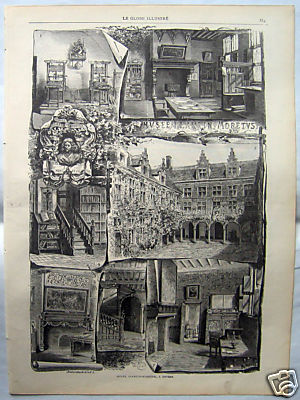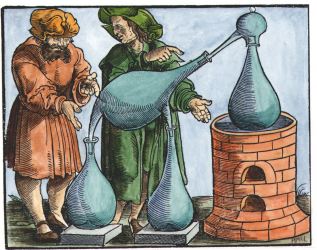| Author | Post |
|---|
Leigh Penman
Member
| Joined: | Wed Aug 27th, 2008 |
| Location: | |
| Posts: | 39 |
| Status: |
Offline
|
|
Posted: Sat Feb 7th, 2009 04:51 am |
|
I came across an interesting reference in a manuscript I am working on at the moment concerning the retail price paid by Paul Nagel (d. 1624), a seventeenth century alchemist and religious dissident, for a book by Michael Maier.
Namely, he paid 3 Schillings for a copy of the Examen Fucorum Pseudo-chymicorum from a bookseller in Halle. In comparison with other purchases, this book was very reasonably priced. A cheaply printed bible from the same year sold for an average of 10 schillings, although they certainly required more labour to typeset, in addition to the costs of paper and ink!
I have actually come across a raft of prices paid for alchemical and relicious books of this period. Is this an under-researched area? Is much known about the costs of books like these? Is there much interest? I might write up an article on this data should this be the case!
L.
|
Paul Ferguson
Member

| Joined: | Fri Feb 15th, 2008 |
| Location: | |
| Posts: | 1538 |
| Status: |
Offline
|
|
Posted: Sat Feb 7th, 2009 01:38 pm |
|
Leigh Penman wrote:
I came across an interesting reference in a manuscript I am working on at the moment concerning the retail price paid by Paul Nagel (d. 1624), a seventeenth century alchemist and religious dissident, for a book by Michael Maier.
Namely, he paid 3 Schillings for a copy of the Examen Fucorum Pseudo-chymicorum from a bookseller in Halle. In comparison with other purchases, this book was very reasonably priced. A cheaply printed bible from the same year sold for an average of 10 schillings, although they certainly required more labour to typeset, in addition to the costs of paper and ink!
I have actually come across a raft of prices paid for alchemical and religious books of this period. Is this an under-researched area? Is much known about the costs of books like these? Is there much interest? I might write up an article on this data should this be the case!
L.
Weren't booksellers still pricing their books by weight at that period?Last edited on Sat Feb 7th, 2009 01:38 pm by Paul Ferguson
|
Johann Plattner
Member

| Joined: | Sat Feb 23rd, 2008 |
| Location: | Germany |
| Posts: | 40 |
| Status: |
Offline
|
|
Posted: Sat Feb 7th, 2009 11:26 pm |
|
You will find interesting information concerning prices of books and also of chemicals, viz. minerals and salts, occuring at the end of the 16th and the beginning of the 17th century in Jost Weyers "Graf Wolfgang II. von Hohenlohe und die Alchemie - Alchemistische Studien in Schloß Weikdersheim 1587-1610".
For example, at page 205 you will come to know that Wolfgang von Hohenlohe wrote to the printer Michael Manger in the year 1590 that the "Turba philosophorum", small and big, are currently not available but already should be translated into German, and asked for sending him the two volumes of the German edition. Furthermore, the printer Manger mentioned that the two editions of the "Pandora" will cost 40 kronen. The price of Conrad Khunrats "Medulla Destillatoria Et Medica" bound together with two additional works was 1 1/2 fl (gulden).
In order to give an estimation of the real value of certain prices the following table for comparison:
 (Ochsen = oxen, Kuh = cow, dreijähriger Stier = 3 years old bull, Schweine = pigs) (Ochsen = oxen, Kuh = cow, dreijähriger Stier = 3 years old bull, Schweine = pigs)
Attached Image (viewed 918 times):
 Last edited on Sat Feb 7th, 2009 11:55 pm by Johann Plattner
|
Leigh Penman
Member
| Joined: | Wed Aug 27th, 2008 |
| Location: | |
| Posts: | 39 |
| Status: |
Offline
|
|
Posted: Wed Feb 11th, 2009 09:55 am |
|
Paul Ferguson wrote: Weren't booksellers still pricing their books by weight at that period?
I haven't heard of this before. In which part(s) of Europe did this take place? Can you point me to a source?
It seems like a possibility.
|
Leigh Penman
Member
| Joined: | Wed Aug 27th, 2008 |
| Location: | |
| Posts: | 39 |
| Status: |
Offline
|
|
Posted: Wed Feb 11th, 2009 09:57 am |
|
Johann Plattner wrote: You will find interesting information concerning prices of books and also of chemicals, viz. minerals and salts, occuring at the end of the 16th and the beginning of the 17th century in Jost Weyers "Graf Wolfgang II. von Hohenlohe und die Alchemie - Alchemistische Studien in Schloß Weikdersheim 1587-1610".
For example, at page 205 you will come to know that Wolfgang von Hohenlohe wrote to the printer Michael Manger in the year 1590 that the "Turba philosophorum", small and big, are currently not available but already should be translated into German, and asked for sending him the two volumes of the German edition. Furthermore, the printer Manger mentioned that the two editions of the "Pandora" will cost 40 kronen. The price of Conrad Khunrats "Medulla Destillatoria Et Medica" bound together with two additional works was 1 1/2 fl (gulden).
In order to give an estimation of the real value of certain prices the following table for comparison:
 (Ochsen = oxen, Kuh = cow, dreijähriger Stier = 3 years old bull, Schweine = pigs) (Ochsen = oxen, Kuh = cow, dreijähriger Stier = 3 years old bull, Schweine = pigs)
Many thanks for the reference Johann! I will check it out
Not being from a country which has the mighty Teuro, I couldn't tell you how many times I've been standing at a cash register in Germany, and upon hearing the total for the transaction, looked at the coins in my hand and wondered "wie viele Schweine macht das?" 
|
Paul Ferguson
Member

| Joined: | Fri Feb 15th, 2008 |
| Location: | |
| Posts: | 1538 |
| Status: |
Offline
|
|
Posted: Wed Feb 11th, 2009 03:56 pm |
|
Leigh Penman wrote:
Paul Ferguson wrote: Weren't booksellers still pricing their books by weight at that period?
I haven't heard of this before. In which part(s) of Europe did this take place? Can you point me to a source?
It seems like a possibility.
I distinctly remember that when I visited the Plantijn-Moretus printing-works in Antwerp ('pieusement conservée dans l'état primitif') I saw a large pair of scales in the little bookshop which were apparently used to weigh the books when they were sold (unless I dreamed it). Can't find a photo of the shop unfortunately...Attached Image (viewed 901 times):
 Last edited on Wed Feb 11th, 2009 03:57 pm by Paul Ferguson
|
Paul Ferguson
Member

| Joined: | Fri Feb 15th, 2008 |
| Location: | |
| Posts: | 1538 |
| Status: |
Offline
|
|
Posted: Wed Feb 11th, 2009 04:08 pm |
|
Paul Ferguson wrote:
Leigh Penman wrote:
Paul Ferguson wrote: Weren't booksellers still pricing their books by weight at that period?
I haven't heard of this before. In which part(s) of Europe did this take place? Can you point me to a source?
It seems like a possibility.
I distinctly remember that when I visited the Plantijn-Moretus printing-works in Antwerp ('pieusement conservée dans l'état primitif') I saw a large pair of scales in the little bookshop which were apparently used to weigh the books when they were sold (unless I dreamed it). Can't find a photo of the shop unfortunately...
And see 'Venice in the Eighteenth Century' by Philippe Monnier, p. 74:
'About the streets, books were sold by weight, like walnuts and apples. Venice was a city of printers...'
|
Leigh Penman
Member
| Joined: | Wed Aug 27th, 2008 |
| Location: | |
| Posts: | 39 |
| Status: |
Offline
|
|
Posted: Thu Feb 12th, 2009 12:29 am |
|
Very interesting, thanks for the references, Paul!
Books by weight is a good idea for cheap print, I suppose. I doubt something like Atalanta Fugiens would have been sold for the same price as a tract with text only, however.
I'm not sure if selling books by weight was ever the case in the Empire, or at least I haven't seen any mention of it in realtion to the late sixteenth/early seventeenth century.
Prices of books in places like England are comparativelyeasy to determine at this stage, given the standards set by the stationers associations, etc. The HRe seems to have been somewhat more chaotic, particularly when competing currency systems circulated simultaneously.
|
Paul Ferguson
Member

| Joined: | Fri Feb 15th, 2008 |
| Location: | |
| Posts: | 1538 |
| Status: |
Offline
|
|
Posted: Thu Feb 12th, 2009 09:09 am |
|
Leigh Penman wrote:
Very interesting, thanks for the references, Paul!
Books by weight is a good idea for cheap print, I suppose. I doubt something like Atalanta Fugiens would have been sold for the same price as a tract with text only, however.
I'm not sure if selling books by weight was ever the case in the Empire, or at least I haven't seen any mention of it in realtion to the late sixteenth/early seventeenth century.
Prices of books in places like England are comparatively easy to determine at this stage, given the standards set by the stationers associations, etc. The HRe seems to have been somewhat more chaotic, particularly when competing currency systems circulated simultaneously.
There's quite a long tradition of selling books by weight as a propaganda tool, e.g. after the French Revolution the books confiscated from the seminaries, theology faculties and religious houses were thus disposed of.
John Sandoe in Kensington (the London one!) used to sell some books by weight and may still do. Selling 'useless' books 'by the yard' is, of course, commonplace. But whether 'good' books, especially illustrated ones, were ever sold by weight at all widely is, I agree, doubtful.
|
Paul Ferguson
Member

| Joined: | Fri Feb 15th, 2008 |
| Location: | |
| Posts: | 1538 |
| Status: |
Offline
|
|
Posted: Thu Feb 12th, 2009 09:30 am |
|
Top right-hand corner in the picture of the Plantijn-Moretus museum above shows the Proofreaders' Room. The table on the right is where they sat to check the proofs brought through the door in the background leading to the presses. On the left is the table where they had their well-earned bread, cheese and beer! The shop was the next and last room as I recall.
'Like the printer Robert Estienne, Plantin exposed galley proofs of his works in front of his establishment and promised a reward to anyone who could find faults.'
http://www.reference.com/browse/Plantin+Press
At the link below is a picture of the bookshop (are those scales on the counter?):
http://flickr.com/photos/jassy-50/1810253880/
The Plantijn-Moretus is well worth a visit if you are ever in Antwerp.
Last edited on Thu Feb 12th, 2009 09:36 am by Paul Ferguson
|

Current time is 09:37 am | |
|

